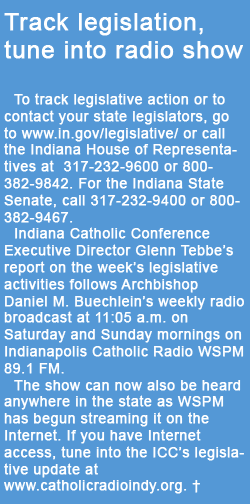Children to benefit from education and
child care proposals
By Brigid Curtis Ayer
Schools in urban and poor areas facing teacher shortages may soon find relief if a teacher shortage bill, Senate Bill 172, becomes Indiana law.
The bill, authored by Sen. Teresa Lubbers (R-Indianapolis), would allow the governing body of a school corporation or an accredited non-public school to hire an individual who is in the process of obtaining a teaching license under the “Transition to Teaching” program.
“The bill is designed to help schools hire licensed teachers in hard-to-find subject areas, such as math, science, special education and English as a Second Language,” Lubbers said, with “the goal being to improve the quality of teachers in those areas where there are shortages.”
 Under the bill, the teachers that are hired from the “Transition to Teaching” program must have subject competency in the subjects they will teach, she said.
Under the bill, the teachers that are hired from the “Transition to Teaching” program must have subject competency in the subjects they will teach, she said.
“The way it is now, the State Board of Education has issued roughly 2,000 emergency teaching permits to fill the teaching shortage, and those teaching with an emergency permit are not required to have a subject competency,” Lubbers said. “Senate Bill 172 will require those in the ‘Transition to Teaching’ program to have subject competency, but overall they are more qualified to teach since they are already working toward licensure.”
Lubbers said her bill is actually becoming less controversial.
“As people are learning more about the bill, support for it is growing,” she said. “This bill also applies to accredited, non-public schools.
“Geographically, school corporations in urban and poor areas are the ones experiencing teacher shortages,” she said.
The teacher shortage bill, which passed the Indiana Senate last month, was approved on Feb. 8 by the House Education Committee. The bill has moved to the House floor for further consideration.
Another important measure affecting children is also moving forward through the legislature. Senate Bill 151, authored by Sen. Connie Lawson (R-Danville), in its original form, would have required child care providers, registered as ministries who receive federal and state funding through vouchers from the Child Care and Development Fund (CCDF), to meet certain child-to-staff ratios.
“Ministries do an excellent job; however, there has been a preponderance of day care providers who have found a loophole in the definition as a ministry,” Lawson said. “These providers, who have no real ministry affiliation, were being exempted from certain child care standards under the registered ministry category.”
Lawson said that one such provider in Indianapolis had 13 2-year-olds attending and only one adult supervising.
“To address this problem, and ensure at the very least certain child-to-staff ratios existed, the bill would have required all child care providers—including those who are registered ministries—to adhere to the minimum child-to-staff ratios,” Lawson said. “But because of the lack of time in the short session—and due to the outcry of ministry organizations—that language of the bill was amended out so that there would be more time to work with ministries to come up with a good definition for a ministry and resolve the problem.”
Lawson said that while the bill is “watered down from its original form,” the current language in Senate Bill 151 will help Family and Social Services Administration (FSSA)—the group which regulates and inspects Indiana child care providers—to comply with child care inspections and drug testing.
“It’s important that we bring more people into providing quality child care, and that’s what we’re trying to do with Senate Bill 151,” Lawson said.
Melanie Brizzi, child care development liaison for FSSA, said, “It’s important for parents to realize that not all child care providers are licensed or are required to follow the same standards. Parents need to ask questions like ‘How many children do you have per each adult?’ There are many ministries out there that provide a very high quality of care, but parents cannot assume that they all operate under the same guidelines because they don’t.”
According to Brizzi, there are 650 child care providers in Indiana operating as registered ministries, and two-thirds of them accept CCDF vouchers. Child care providers which operate as registered ministries are currently not required to have child care development training and are exempted from child-to-staff ratios.
Approximately $122 million in government funds is spent in Indiana through CCDF vouchers. The vouchers were developed in the early 1990s as part of the federal welfare reform program.
Senate Bill 151 passed the Senate and has been assigned to the House Committee on Family, Children and Human Affairs, where it is awaiting a hearing.
Because this is a short session, bills must be passed in committee by the end of February. The Indiana General Assembly must adjourn by March 14.
(Brigid Curtis Ayer is a correspondent for The Criterion.) †
 Under the bill, the teachers that are hired from the “Transition to Teaching” program must have subject competency in the subjects they will teach, she said.
Under the bill, the teachers that are hired from the “Transition to Teaching” program must have subject competency in the subjects they will teach, she said.